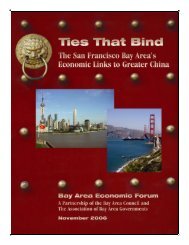PDF: 2962 pages, 5.2 MB - Bay Area Council Economic Institute
PDF: 2962 pages, 5.2 MB - Bay Area Council Economic Institute
PDF: 2962 pages, 5.2 MB - Bay Area Council Economic Institute
You also want an ePaper? Increase the reach of your titles
YUMPU automatically turns print PDFs into web optimized ePapers that Google loves.
Global Reach<br />
Market Opening<br />
Under the terms of its membership in the World Trade Organization, India has officially<br />
committed to opening its legal services market to foreign law firms in 2009. A four-year<br />
review of the current system is due to conclude, but U.S. attorneys familiar with Indian<br />
politics are skeptical. Raj Judge, an attorney with Wilson Sonsini Goodrich & Rosati who does<br />
extensive cross-border work, says “there’s a lot of talk about India opening, but I don’t see it<br />
happening in the foreseeable future because the Indian lawyers aren’t going to let it happen.”<br />
The Indian legal community is divided on market opening. Young attorneys and law school graduates<br />
see greater opportunity and more challenging work in joining a global firm but would prefer<br />
not to relocate abroad. Long-established family-owned law firms and state bar associations are deeply<br />
opposed, fearing a sudden easing of rules and open competition. They have so far effectively<br />
persuaded India’s High Courts to constrain even the liaison office activities of foreign law firms.<br />
<strong>Bay</strong> <strong>Area</strong> Connections<br />
Opportunities for <strong>Bay</strong> <strong>Area</strong> law firms to develop India practices and generate business have been<br />
limited but are gradually expanding. Foreign lawyers (except graduates of Commonwealth law<br />
schools) and Indian nationals employed with foreign firms are barred from practicing or interpreting<br />
Indian law. Foreign firms may establish “liaison offices” in India and advise foreign or<br />
Indian clients engaged in cross-border business, but even that activity has been constrained by<br />
the Mumbai High Court. <strong>Bay</strong> <strong>Area</strong> firms maintain exclusive, preferred vendor, or ad hoc alliances<br />
with Indian law firms, similar to what is customarily done in China.<br />
To date, key differences with China have been: (1) the relatively slow development of cross-border<br />
M&A and venture-funded entrepreneurial startups in India; and (2) the larger indigenous talent<br />
pool of bilingual accountants, attorneys and management consultancies in India to structure deals<br />
and undertake due diligence in commercial transactions without looking abroad for support.<br />
Snehal Patil joined Perkins Coie LLP in Menlo Park in 2009, after coming to the U.S.<br />
in 2004 and working with The Chugh Firm in Santa Clara and then Thelen Reid Brown<br />
Raysman & Steiner in San Francisco. Patil’s work in India included litigation and transaction<br />
work involving corporate law, trademark and copyright protection, and real estate. His<br />
India work with Perkins and other firms has extended to include representing U.S. companies in<br />
their joint ventures and strategic partnerships with Indian entities; assisting an Indian firm with a<br />
$20 million acquisition of a Silicon Valley startup; assisting U.S. and Indian companies in structuring<br />
M&A transactions and offshore entities; negotiating technology licensing and distribution<br />
rights; assisting India-based companies in establishing U.S. subsidiaries; and representing media<br />
and entertainment firms with copyright and trademark registrations in the U.S. and India.<br />
Patil acknowledges that there is still a clear separation of cross-border work done by Indian and<br />
U.S. attorneys, although Indian-origin firms in the U.S. are able to hire naturalized NRIs and<br />
compete here for business, particularly in the startup and middle-market segment. As opposed to<br />
international arbitration, he says, litigation in court is the favored route of most Indian businesses<br />
for resolving commercial disputes, particularly if there is a possibility of obtaining a favorable<br />
92








